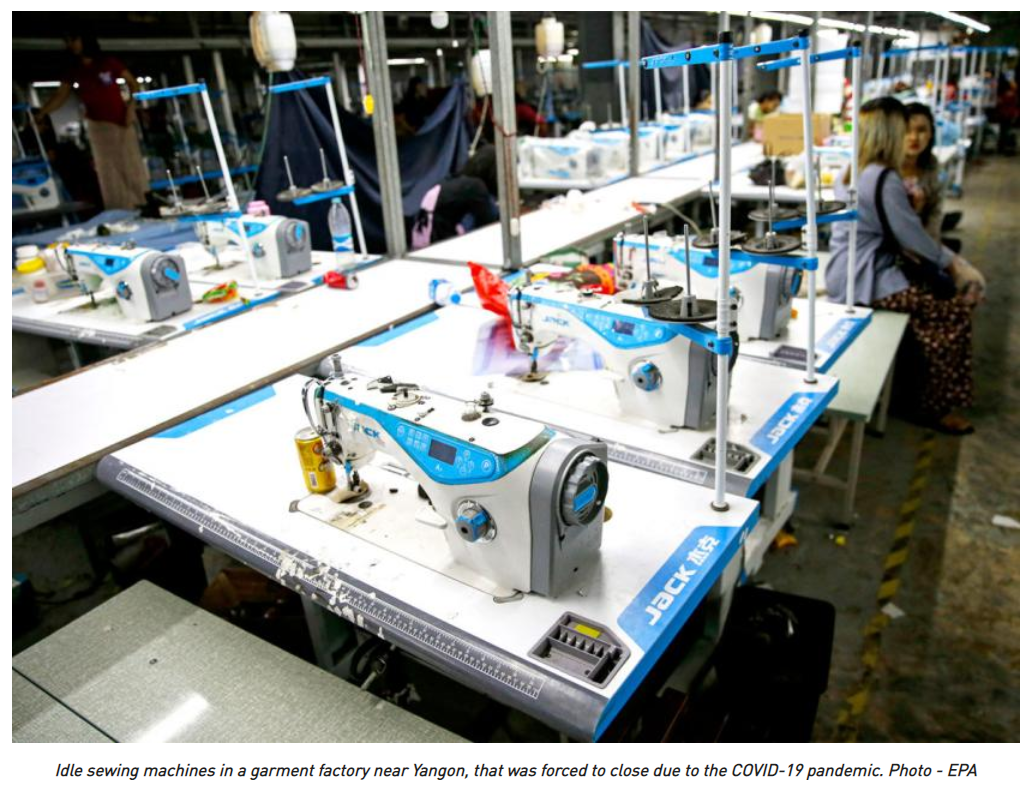Myanmar: Provide aid to foreign-owned garment businesses also: ambassador
South Korean and Chinese stakeholders in Myanmar are urging the authorities to review the possibility of providing a stimulus package for foreign investors in the local garment industry at a time when the supply of raw materials has stalled and importers from the West have begun to cut orders from Myanmar’s factories.
Myanmar’s manufacturing industry is experiencing an unprecedented slowdown as a result of COVID-19 pandemic sweeping the world.
In a recent interview, South Korean Ambassador to Myanmar Lee Sang-hwa told The Myanmar Times that South Korean garment businesses are struggling to sustain their operations, but they are willing to tighten their belts and share the burden instead of laying off workers.
“Given the magnitude of the suffering, the Myanmar government should proactively consider an incentive and stimulus package [for foreign garment businesses] as far as they can,” he said.
Garment industry export values topped rice exports at US$4 billion last year, and the sector now employs over 700,000 workers country-wide due to the labour-intensive nature of the work. Among approximately 600 garment factories, 400 of them are Chinese-owned, and South Korea account for around 100.
Since January, the number of factories shutting down has reached 38 with nearly 17,000 workers laid off or forced to take leave. Of these, garment factories amounted to 22.
The Chinese government’s strict measures to prevent domestic spread of COVID-19 in February have severely disrupted the timely supply of raw materials, which garment factories in Myanmar depended on. China supplies more than 90 percent of raw materials for the garment factories in Myanmar.
Although more than 70pc of Chinese factories have now resumed production, the outbreak in Europe and the United States has resulted in reduced demand and cancelled orders, dealing the garment industry in Myanmar another blow.
U Myint Soe, chair of Myanmar Garment Manufacturers Association (MGMA), said last week that operations of the factories that have accepted orders from the EU have stopped operations.
“I see a ray of hope as [China’s] situation gets better as they have started to resume the production of raw materials and started to send it over to Myanmar, but it’s not enough,” the envoy said.
“It does take time to get back to normalcy,” Lee said, however, there need to be measures taken to bridge the gap, he stressed.
In response to the COVID-19 economic crisis, the Ministry of Planning, Finance and Industry announced on March 18 a K100 billion (US$72 million) COVID-19 fund and extended the income tax payment period for the cut-make-pack industry as well as the tourism sector and SMEs, which are seen as “receiving the most negative economic losses”, according to notification 1/2020. However, foreign businesses are excluded from applying for loans from the fund.
While Lee viewed it as “a step in the right direction”, he added a stimulus package tailored for foreign CMP businesses should also be considered.
Employment conditions, for example, could be more lenient based on a consensus reached by the employer and workers allowed to take unpaid leave and lower overtime payment from the current 200 percent.
In addition to offering low-interest rate emergency loans to domestic garment factories, the Myanmar government could extend similar aid to foreign investors in the sector as well, Lee suggested.
In view of the delayed or stalled supply of raw materials, fast-tracking customs procedures is another effective measure the government could consider.
The Chinese embassy echoed the Lee’s opinion. “Chinese factories wish to see similar economic stimulus package being made applicable to them to help them mitigate the impact posed by the pandemic,” the Economic and Commercial Office of the Chinese Embassy told this newspaper.
In addition, the Myanmar government should provide clear guidelines for the management of employee’s payment standards as more Chinese factories are shutting down, the Office added.
Source: https://www.mmtimes.com/news/provide-aid-foreign-owned-garment-businesses-also-ambassador.html


 English
English




